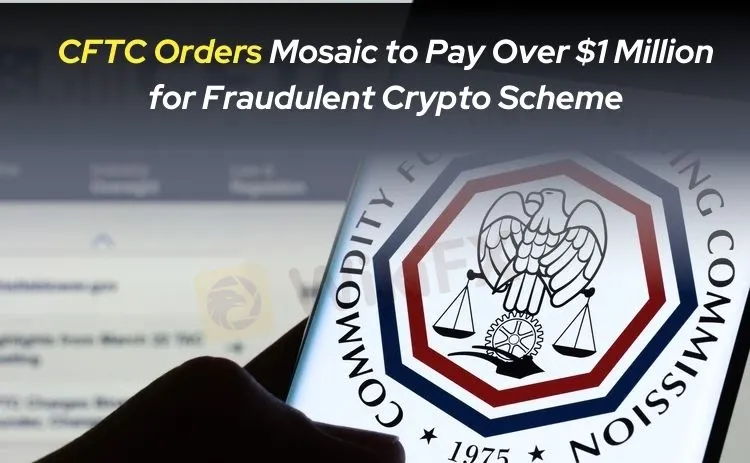简体中文
繁體中文
English
Pусский
日本語
ภาษาไทย
Tiếng Việt
Bahasa Indonesia
Español
हिन्दी
Filippiiniläinen
Français
Deutsch
Português
Türkçe
한국어
العربية
CFTC Orders Mosaic to Pay Over $1 Million for Fraudulent Crypto Scheme
Abstract:The U.S. Commodity Futures Trading Commission (CFTC) has recently filed a significant lawsuit against Mosaic Exchange Limited and its CEO, Sean Michael, alleging a fraudulent digital asset commodity scheme that occurred between February 2019 and June 2021.

According to the CFTC‘s allegations, Mosaic Exchange and Michael falsely claimed to at least 17 investors from the U.S. and other countries that the platform managed tens of millions of dollars in assets and operated a proprietary trading algorithm with an accuracy rate of 82%, delivering monthly profits between 10% and 60%. They also claimed partnerships with well-known cryptocurrency exchanges like BitMEX and Binance. However, the CFTC’s investigation revealed that these claims were fabricated, designed to entice investors into entrusting their Bitcoin and other assets for trading purposes.
The CFTC further noted that Mosaic Exchange failed to achieve the promised profitability and, instead, suffered losses while trading on behalf of its clients. Additionally, Michael misappropriated client funds for personal expenses, including dining and travel, rather than using them for the pledged trading activities. This resulted in substantial financial losses for numerous investors.

The CFTC has filed the lawsuit in the U.S. District Court for the Southern District of Florida, charging Mosaic Exchange and Michael with violations of the Commodity Exchange Act (CEA) and related CFTC regulations. The CFTC seeks restitution for victims, disgorgement of ill-gotten gains, civil monetary penalties, and a permanent ban on the defendants from trading or registering in any CFTC-regulated markets.
In a statement, CFTC Commissioner Kristin N. Johnson emphasized that such fraudulent schemes pose significant risks to investors, especially in the digital asset sector. She called for enhanced investor protection measures to combat Bitcoin fund fraud and safeguard market integrity.
This case serves as a stark reminder for investors to exercise caution when engaging in digital asset investments. Faced with promises of high returns and unverified trading platforms, investors are urged to conduct thorough due diligence and choose regulated financial institutions to avoid falling victim to similar fraudulent schemes.
Disclaimer:
The views in this article only represent the author's personal views, and do not constitute investment advice on this platform. This platform does not guarantee the accuracy, completeness and timeliness of the information in the article, and will not be liable for any loss caused by the use of or reliance on the information in the article.
Read more

Elderly Ipoh Man Loses Nearly RM1 Million in Online Investment Scam
An elderly man in Ipoh, Malaysia, has fallen victim to an online investment scam, losing RM974,000 in the process. The 67-year-old’s ordeal came to light after he lodged a report with the Ipoh district police on January 11, 2025.

Businessman Loses RM1.38mil in Online Investment Scam
Malaysian businessman loses RM1.38mil in IPO investment scam after falling for fraudulent overseas investment platform. Learn how to avoid such traps and protect your finances.

PayPal Users Warned About Sophisticated "No-Phish" Cyberattack
PayPal issues an alert about a new 'no-phish' cyberattack targeting users directly through its platform. Learn how this advanced scam works and how to stay safe.

400 Foreign Nationals Arrested in Crypto Scam Raid in Manila
400 foreign nationals were arrested in Manila, Philippines during a large-scale raid on an online scam farm linked to human trafficking and fraud. Learn more about this crackdown.
WikiFX Broker
Latest News
Wolf Capital Exposed: The $9.4M Crypto Ponzi Scheme that Lured Thousands with False Promises
Confirmed! US December non-farm payroll exceeded expectations
Spain plans 100% tax for homes bought by non-EU residents
90 Days, Rs.1800 Cr. Saved! MHA Reveals
The Yuan’s Struggle: How China Plans to Protect Its Economy
LiteForex Celebrates Its 20th Anniversary with a $1,000,000 Challenge
400 Foreign Nationals Arrested in Crypto Scam Raid in Manila
Singapore Blocks Polymarket Access, Following U.S. and France
OneZero Collaborates with Ladies Professional Golf Association (LPGA)
Housewives Scammed of Over RM1 Million in Gold Investment Fraud
Currency Calculator






